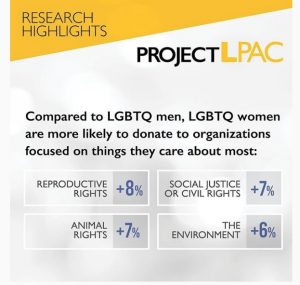

As the 2020 presidential election approaches, a new in-depth survey of LGBTQ women’s political engagement raises questions about how candidates can galvanize LGBTQ women to show up to the polls.
LPAC, a political organization dedicated to raising LGBTQ women’s voices in politics and supporting candidates from the community, oversaw the qualitative and quantitative research survey. The study, conducted by Lake Research Partners over the summer of 2019, shows how LGBTQ women are a distinct political community.
“We’re not an insignificant community, but we’re often invisible,” says Stephanie Sandberg, Executive Director for LPAC. “If we’re trying to motivate this community, we need to know how to talk to them.”
Sandberg says it’s typical for LGBTQ women to be polled and represented with demographic data for women or LGBTQ men. However, the study shows LGBTQ women often find certain issues more important or are motivated in different ways than these groupings would have people believe.
According to the research survey, 60% of women compared to 47% of men in the LGBTQ community are strongly motivated by housing discrimination. LGBTQ women surveyed cared more about the environment and climate change by a 14-point margin compared to straight women surveyed. About 20% of LGBTQ women of color say candidates who share their background or identity would make them more interested in getting involved in politics compared to 4% of LGBTQ white women, according to the study.
“The issues aren’t different in that they matter, but in how much they matter,” says Sandberg.
 Lisa Turner is the Senior Director for Research and Political Engagement for LPAC’s research branch, Project LPAC. She says the biggest surprise derived from this study was that it hadn’t been done before.
Lisa Turner is the Senior Director for Research and Political Engagement for LPAC’s research branch, Project LPAC. She says the biggest surprise derived from this study was that it hadn’t been done before.
“To have insights and to generally share the data and be able to spread the word that we have a pathway to elevate our community is empowering,” says Turner. “For the first time, we have the tools and insights to motivate a community that has struggled to come together.”
Turner says while many LGBTQ women involved in politics or national organizations have surmised some of the study’s findings or at least understood that LGBTQ women were a unique “electoral universe,” the data gives them validity. With the upcoming election, Turner says leaders can have a more fine-tuned idea of how to motivate LGBTQ women to vote.
“We intend to create a new electoral engine this cycle that does unique political work that empowers and helps LGBTQ women,” Turner explains.
Turner says in the end, this data will not only help validate LPAC’s endeavors, but hopefully encourage presidential candidates to cater to LGBTQ women and their stances.
“The person who is going to be dethroning the current president won’t get there without the LGBTQ women’s support,” says Turner. “The pathway to the White House needs to be progressive and inclusive of this community.”
“Encouraging more LGBTQ women to vote this election cycle could literally be the difference between a win or a loss for a number of progressive candidates,” adds Sandberg. “The stakes couldn’t be higher for the future of our democracy – when candidates think about how to tailor their message, don’t forget to speak to this important segment of the electorate.”
To see the full research, visit www.projectlpac.org. For more information about specific differences between LGBTQ women and straight women, visit https://www.teamlpac.com/the-latest/lgbtq-straight-women-research.